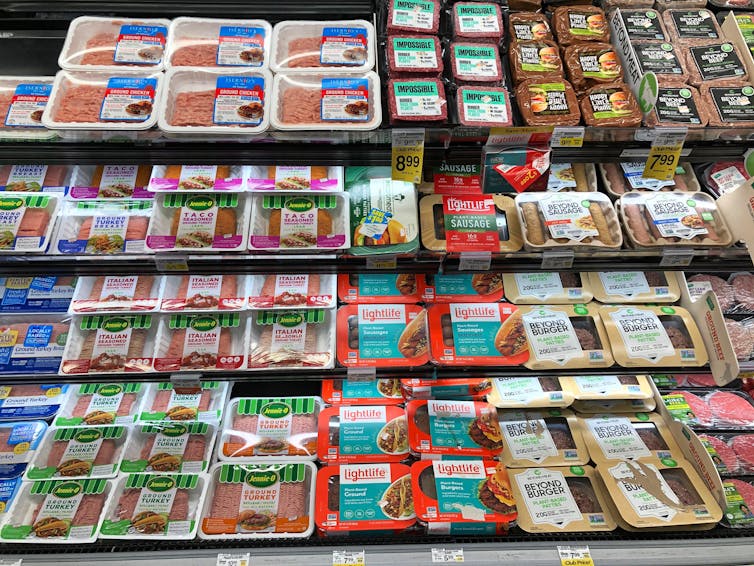Rachel Pechey, University of Oxford
Rearing meat contributes more greenhouse gas emissions than the production of any other foodstuff. And eating red and processed meat can increase your risk of developing colorectal cancers.
If eating less meat is good for you and the planet, then recent research has some good news: meat consumption – particularly red meat – is slowly falling in the UK. But for diet changes to really pick up the pace, it needs to be easier for everyone to make more sustainable and healthy choices.
Surveys suggest that despite increasing support for the idea of eating less meat, the UK public has little appetite for interventions by the government to achieve this, whether that might be taxes, labelling or a media campaign.
So what if shops and restaurants took the lead by providing more meat-free options to choose from? Would this make people more likely to eschew meat? It’s not guaranteed – there are strong social influences and cultural norms that reinforce the appeal and habit of eating meat. For example, when asked why they eat meat, people often tend to describe meat as being “necessary, natural, normal and nice”.

Nonetheless, in three studies, my research team and I tested the effect of increasing meat-free options on the meals people choose.
First, we looked at sales in a university cafeteria that changed the menu to offer two plant-based and one meat option, instead of one plant-based and two meat options, for four months. When a third of the options were meat-free, around 40% of the meals diners bought were meat-free. This rose to around 60% when two-thirds were meat-free.

In the second study, a nationwide catering company put more plant-based options on their list of meals for cafeteria managers to create their menus with. We analysed sales in 18 worksite cafeterias supplied by this company for the eight weeks before and eight weeks after the new list of meal options was available. Where there was a small increase in the number of plant-based meal options, sales of plant-based meals overall increased by a small amount, but only around half of the chefs took up the new menu options.
In the third study, we recruited 2,205 UK adults to take part in an online questionnaire. We divided them into three groups, each having four main meals to choose from. Of these four options, either one, two or three were meat-free. Faced with three meat options, just 12% chose the meat-free meal, but when there were three meat-free options, 48% made that choice. Where options were equal, 28% opted for the meat-free choice.
Less meat or meat-less
To identify interventions that could help everyone eat less meat and not just those who already eat less than most, we looked at whether increasing meat-free options in our online study had a different effect on particular groups.
Regardless of their usual meat consumption, everyone ate less meat when there were more meat-free options. This is encouraging, as it’s possible to reduce meat consumption the most when everyone can cut back a bit, instead of a few people cutting back a lot or becoming vegetarian (though one person being vegan could potentially offset others taking no action).
Having more meat-free meals on menus or in stores may have other benefits too. Without a wide enough range of meat-free options in shops and restaurants, other measures such as ecolabels – labelling food with its environmental impact to help people buy more sustainable products – may lose their bite. After all, how much can we expect labelling to change food choices if all the options have low ratings? We have research on this topic in the pipeline.
Making plant-based options more prominent may also begin to reverse public perceptions of meat-eating as the norm. Increasing the number of vegetarian options may signal that choosing a vegetarian meal is more commonly done by others and subconsciously nudge people to follow the trend. If just one of four options is meat-free, this could be seen as an option just for vegetarians. If half are meat-free, people have a choice of dishes which suggests plant-based food is in demand more generally, rather than being a niche choice. Of course, there is also a greater chance of there being one they would like.

Meat the deadline
The National Food Strategy recommended that people in the UK eat 30% less meat by the end of the decade to reach net zero by 2050. People have ingrained habits, so it’s important to find ways to help them make more sustainable food choices and to keep making them.
Nearly three in four people believe it’s important to buy sustainable food. Simple changes, such as providing more plant-based options in shops and restaurants, could help people to meet this goal.
Adding appealing plant-based or vegetarian options to menus could get the ball rolling on the urgent changes needed, as well as enhance the impact of promising, but perhaps harder-to-implement measures, like ecolabels.
Don’t have time to read about climate change as much as you’d like?
Get a weekly roundup in your inbox instead. Every Wednesday, The Conversation’s environment editor writes Imagine, a short email that goes a little deeper into just one climate issue. Join the 10,000+ readers who’ve subscribed so far.
Rachel Pechey, Research Fellow in Behavioural Science, University of Oxford
This article is republished from The Conversation under a Creative Commons license. Read the original article.
Posted on:


